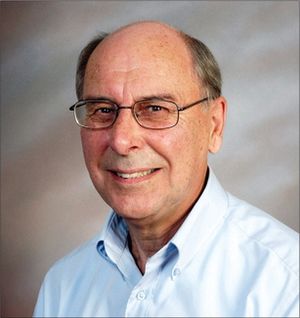Dudley Williams (biochemist) facts for kids
Quick facts for kids
Dudley Williams
FRS
|
|
|---|---|
 |
|
| Born |
Dudley Howard Williams
25 May 1937 Farsley, West Riding of Yorkshire, England
|
| Died | 3 November 2010 (aged 73) Cambridge, England
|
| Education | Pudsey Grammar School |
| Alma mater | Leeds University (BSc, 1958 PhD, 1961) |
| Spouse(s) | Lorna Patricia Phyllis Bedford |
| Children | 2 |
| Awards | See list |
| Scientific career | |
| Fields | Chemistry Organic Chemistry |
| Institutions | Cambridge |
| Doctoral advisor | Basil Lythgoe |
| Other academic advisors | Carl Djerassi |
| Notable students | Jeremy K M Sanders |
Dudley Howard Williams (1937–2010) was an important British scientist. He was a biochemist, which means he studied the chemistry of living things. He was famous for using special tools called nuclear magnetic resonance (NMR) spectroscopy and mass spectrometry to figure out the exact shapes of tiny molecules. He especially used these tools to study an important medicine called vancomycin, which is an antibiotic.
Contents
About Dudley Williams
Early Life and Education
Dudley Howard Williams was born on May 25, 1937, in a place called Farsley in Yorkshire, England. He was the only child of Lawrence and Evelyn Williams. Dudley went to Pudsey Grammar School. After that, he earned a spot at the University of Leeds. In 1958, he graduated with top honors in Chemistry.
Research and Discoveries
Dudley Williams continued his studies at Leeds. He worked on his PhD, focusing on how to create Vitamin D and similar compounds. His professor, Basil Lythgoe, guided his research. Dudley earned his PhD in 1961.
That same year, he received a special scholarship called a Fulbright Scholarship. This allowed him to move to Stanford University in the United States. There, he worked with another famous scientist, Carl Djerassi. They explored how to use mass spectrometry (MS) in organic chemistry. Mass spectrometry helps scientists weigh and identify molecules.
Dudley also spent his evenings learning about nuclear magnetic resonance (NMR). NMR is another powerful tool that helps scientists understand the structure of molecules. He used a special 100 MHz instrument at Varian Associates. In just three years, Dudley showed how these two tools, mass spectrometry and NMR, could completely change how chemists worked. His books and research papers helped revolutionize the field of organic chemistry.
Moving to Cambridge
In 1964, Dudley Williams moved to Cambridge, England. He took a junior position in Organic Chemistry at the invitation of Lord Todd. A key condition for him to move was that the department needed to buy the latest NMR and mass spectrometry machines. Dudley stayed at Cambridge for the rest of his career, retiring in 2004.
His scientific work involved many different areas that often overlapped. Here are some of his main contributions:
- NMR and Mass Spectrometry
- He found new ways to use NMR to get more detailed information about molecules.
- He used mass spectrometry to figure out the order of parts in important biological molecules called peptides. These include molecules like gastrin and insulin.
- Understanding Antibiotics
- In 1969, Dudley took on the challenge of figuring out the structure of vancomycin. Vancomycin is a very strong natural antibiotic that fights against certain types of bacteria.
- Ideas on Evolution
- Dudley also thought deeply about evolution. He believed that "natural products," like chemicals found in many plants, must have an important role. Even if their job wasn't known yet, he argued they were too complex to exist without a purpose.
Awards and Honors
Dudley Williams received many awards for his important work:
- 1964: Became a Fellow of Churchill College
- 1966: Received the Meldola Medal
- 1968: Awarded the Corday–Morgan Medal
- 1983: Became a Fellow of the Royal Society, a very high honor for scientists
- Tilden Medal, Royal Society of Chemistry
- 1984: Structural Chemistry Award, Royal Society of Chemistry
- 1990: Became a member of Academia Europaea
- 1990: Received the Bader Award
- 1996: Awarded the Leo Friend Award
Personal Life
Dudley Williams married Lorna Patricia Phyllis Bedford, known as Pat, in 1963. They had met while he was studying at Leeds. They had two sons, Mark Howard, born in 1966, and Simon Bedford, born in 1968.
Dudley Williams retired in 2004. Six years later, he became ill with liver cancer. He passed away in Cambridge on November 3, 2010.

